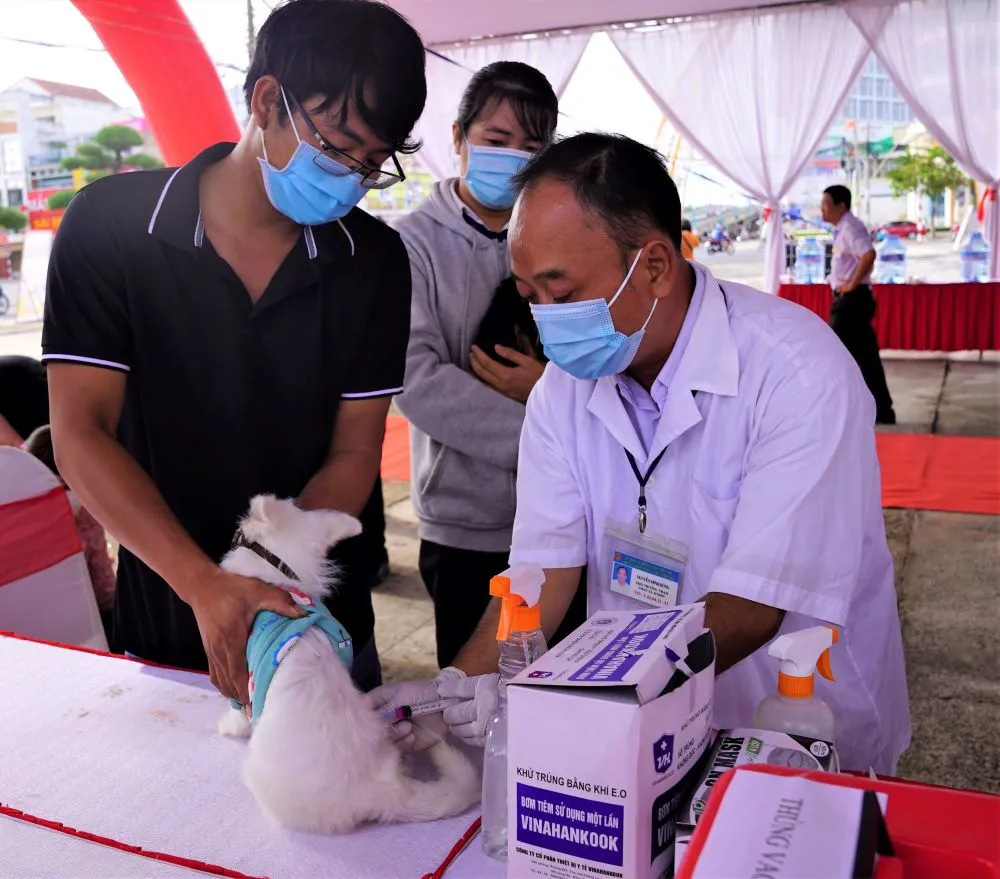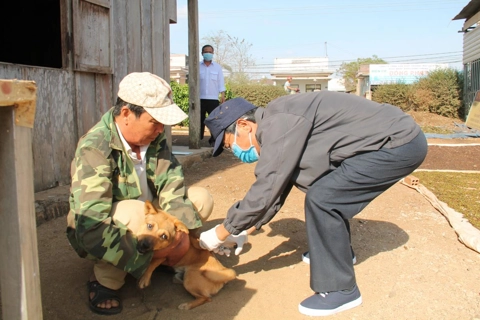Vietnam reports 70-100 human deaths from rabies each year
International partners are working with the Government of Vietnam to end rabies-mediated deaths by 2030 as part of the global efforts to achieve ‘Zero by 30’ goal.
About 70-100 people in Vietnam die of rabies yearly despite some progress made over the past ten years.
The data was announced today by the World Health Organization (WHO), the Food and Agriculture Organization of the United Nations (FAO), and the United States Centers for Disease Control and Prevention (US CDC), adding that the figure in the first eight months of 2022 was 40.
Despite a significant decrease in rabies deaths in some provinces, the number of victims increased in 20 provinces over the years 2017 to 2021 compared to 2011 to 2016.
This highlights the need to adopt lessons learned and work closely with local governments to ensure a decrease in deaths.
| Representatives of WHO, FAO, US CDC, and Vietnam join hands to commit for Zero by 30 goal. Photos: WHO |
International efforts for ‘Zero by 30’
On World Rabies Day 2022 [September 28], WHO, FAO, and US CDC commit to standing with Vietnam to eliminate human deaths from dog-mediated rabies by 2030 as part of the global efforts toward this goal.
The World Rabies Day 2022-themed “One Health, Zero Deaths” leverages the concept of One Health that is becoming increasingly entrenched in disease control programs. Examples such as Covid-19 and antimicrobial resistance have shown that the health of people, animals, and the environment are all inextricably linked and interdependent.
The spirit behind this year’s theme encourages collaboration, partnership, and a joint approach toward rabies elimination – or “Zero Deaths”, in line with the “Zero by 30: Global Strategic Plan for the elimination of dog-mediated human rabies deaths by 2030”.
Dr. Socorro Escalante, Acting WHO Representative in Viet Nam, emphasized the need for strong commitment and the targeting of priority areas to eliminate deaths by 2030. “Strengthening political commitment to ensure access, availability and affordability to proven interventions such as safe, effective and quality-assured vaccines, is critical to saving lives and ensuring a One Health approach to eliminating rabies.”
She reiterated that solid coordination between animal, human health, and other sectors is vital to ensure prevention and control programs are efficiently and effectively managed.
Dr. Rémi Nono Womdim, FAO Representative in Vietnam, highlighted the role of increasing international and high-level political support for One Health as a sustainable solution to combat threats such as rabies.
“By working together using the One Health approach to increase rabies vaccination coverage in animals to at least 70%, we can break the transmission of rabies to humans and accelerate the progress toward the ‘Zero by 30’ goal,” he said
Obviously, Womdim stressed the role of dog vaccination, naming it “the most cost-effective single intervention to protect humans from contracting rabies.”
“To improve the canine vaccination coverage, we need to ensure the availability, accessibility, and affordability (3A) of rabies vaccine,” emphasized Dr. Lindsay Kim, Global Health Security Program director, US CDC office in Vietnam.
She believes that strengthening rabies surveillance using the One Health approach and integrating it with the event-based surveillance program should also be focused on getting closer to the ‘Zero by 30’ goal. The approach is currently implemented and advocated by Vietnam’s Ministry of Health.
| Dog vaccination in Vietnam. |
Specific moves
In recognition of World Rabies Day 2022, a joint event and meeting were hosted on September 28 in Ben Tre with support from FAO, WHO, US CDC, and other organizations to highlight a shared commitment to the ‘Zero by 30’ goal, review results of Vietnam’s National Rabies Control Program, and discuss opportunities for supporting increased vaccination in dogs.
The Government of Vietnam is committed to achieving the 2030 goal of eliminating human deaths from dog-mediated rabies by renewing the National Program on the Control and Elimination of Rabies 2022–2030.
The WHO, FAO, and US CDC reaffirm their continued support for Vietnam in developing essential policies and mechanisms to reduce deaths. They encourage the Government, particularly at the local level, to prioritize and increase resources for managing dog populations, vaccinating dogs, and providing post-exposure prophylaxis for those bitten by dogs.
The bodies mentioned above commit to providing ongoing technical support to the Government of Vietnam as they work together to end human deaths from dog-mediated rabies.
Furthermore, the One Health aspect of the theme emphasizes the importance of collaboration, ensuring all people (whether professional or a member of the public) act together as integral partners who can make a difference and contribute to collective action toward rabies elimination. This approach exemplifies One Health as an impetus for the participation and collaboration among human, animal, and environmental sectors.
The global strategic plan was jointly adopted by WHO, FAO, the World Organization for Animal Health (OIE), and the Global Alliance for Rabies Control (GARC) in 2018. In Vietnam, the Ministry of Health, the Ministry of Agriculture and Rural Development, and local governments, with support from these international partners, have been working together to implement the National Program on Rabies Prevention and Control.













